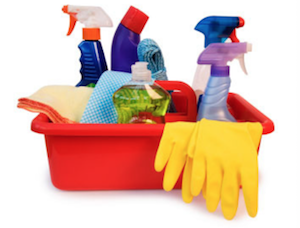How to Safeguard Your Family Against Home Health Risks
The last thing we want to think about is the danger our homes could pose to our health. Yet, studies find that hazards, pollutants, and dangers exist within our homes that can aggravate allergies, sinuses, skin, respiratory and gastrointestinal systems, and more. Worse still is the fact that so many people do not realize the ways in which our homes make us sick. To help you protect your family, we share some tips for safeguarding your family against home health risks here.
Take a Good Look at Your Household Cleaners
We think that our household cleaners are safe because they are marketed for home use. Unfortunately, studies show that 21 common household cleaners contain air contaminants, including 24 that are associated with serious health concerns and cancer. Even the fragrances in household cleaners are known to cause respiratory problems for people. If you have not looked at the ingredients and warning labels on your cleaners, do so immediately. At the very least, you should follow the directions for use to the letter and ensure that you run a fan and open a window when you clean.
Better yet, replace your household cleaners with organic or homemade, non-toxic products. For example, you can mix water with vinegar or lemon juice to clean glass. Use baking soda as a scouring agent and borax mixed with water as a multipurpose cleaner.
Get a Home Inspection
You may be familiar with home inspections as a task to complete when buying or selling a home, but you should consider getting a home inspection for peace of mind. Certified home inspectors carefully examine the interior and exterior of your home and can point out potential problems, safety hazards, defects, and other concerns to homeowners.
Be Aware of Carbon Monoxide Danger
Carbon monoxide poisonings can happen at any time, but the number of occurrences rises when the power goes out and people use generators, when people use gas ranges or fireplaces, or when people leave their cars running inside the garage. Other sources of carbon monoxide dangers in the home include unvented kerosene and gas space heaters, leaking chimneys and furnaces, furnace back-drafting, gas water heaters and woodstoves and fireplaces, and tobacco smoke.
Carbon monoxide is odorless, colorless, and tasteless, which makes it very dangerous. Initial symptoms include headache, weakness, dizziness, and nausea, but symptoms can worsen to include vomiting, shortness of breath, confusion, blurred vision, and loss of consciousness when the poisoning increases. If the carbon monoxide issues develop slowly, victims may mistakenly believe they have the flu.
To prevent carbon monoxide poisoning, install carbon monoxide alarms in hallways near areas used for sleeping. Make sure that your appliances are in good working order and have them repaired if they are not. Have your heating system professionally inspected and serviced once a year and make sure that professionals check and clean your chimneys and flues. Do not operate any gasoline-powered tools or generators in the house or any enclosed space. Should your carbon monoxide alarm sound, immediately go outside and call 911.
Prevent Leaks and Check for Mold
Mold often is the culprit behind homes that make people sick. The problem with mold is that it can grow any place where small amounts of water collect. This means mold may form in air ducts, overhead vents, windows that collect condensation, bathroom floors, bathtubs, kitchen sinks, and any other area where water collects. If your home is too humid, mold can begin to grow behind walls and above ceilings, so you may not even be aware of its presence.
If you do see mold growing, use bleach to kill it and prevent more growth. If you suspect that mold is growing in hidden places, contact a professional to come in and do an assessment of your home. Sometimes, people must hire professional cleaning services to remove mold from their homes. The best way to prevent mold is to reduce the amount of humidity in your home, run bathroom fans during and after a shower, and use dehumidifiers when and where necessary.
Of course, you want to do all you can to keep your family safe and healthy. That’s why you should be aware of the hidden dangers in your home and know how to safeguard your family against them.
Image via Flickr


